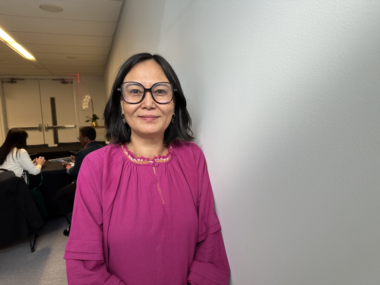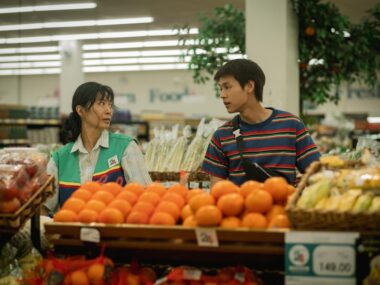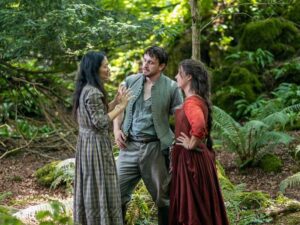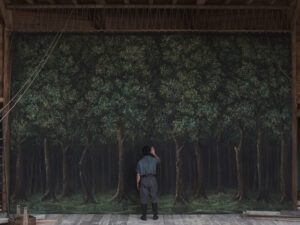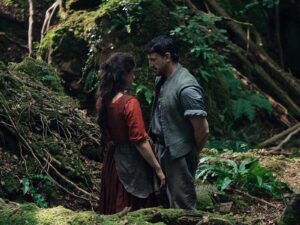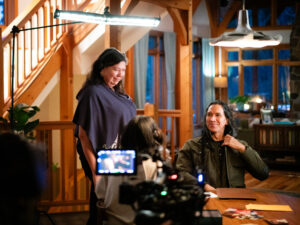Crocodile Tears is a coming-of-age thriller film revolving around the life of ‘Johan’ and his mom on a remote crocodile farm. The arrival of a young girl upends their life in this slow-burning thriller. The movie made its North American premiere at the Toronto International Film Festival on September 9 and is slated to compete at the BFI London next month.
Director and Screenwriter Tumpal Tampubolon is an Indonesian filmmaker who received his first award in 2005 for the Script Development Competition- Best Short Fiction category at the Jakarta International Film Festival for his very first screenplay, The Last Believer. His subsequent accolades at the Indonesian Film Festival and Busan Film Festival sealed his presence in the Asian film industry. This movie is his feature-length debut.
Marissa Anita is a journalist, actress and television news presenter. After a remarkable career as a reporter and later anchor for Metro TV, her acting performance in the movie In the Absence of the Sun brought her to the spotlight. She is also the recipient of the Indonesian Film Festival’s Citra Award for her performance in Ali & Ratu Ratu Queens.
Yusuf Mahardika is an Indonesian actor, director, and football player. Yusuf began his career as a footballer who won first place in several races, such as All-Star Galapuri U-10 and JNE CUP U-10 in 2009. He rose to acting prominence after playing the role of ‘Madun’ in the soap opera Madun’s Kick.
One Lash Shot had the opportunity to speak with Tumpal, Marissa and Yusuf, about the behind-the-scenes of Crocodile Tears.

How did you first become interested in movies?
Tumpal: My father had a Betamax camera actually, that he used to record us on our daily routine. He was the video lender to my grandmother who lived on another island in Sumatra. I lived in Jakarta. At that time, we didn’t have internet yet, so every Christmas he would record me and my sister saying “Merry Christmas Grandmother and Grandfather”, and he would send it to them.
I think from then on, I was interested in cinema. But I never thought I would become a filmmaker. My bachelor’s degree was in Mathematics; it had nothing to do with film (laughs).
But, yeah, my passion is storytelling. I really want to tell stories- it’s always been on my mind. Once, I finished my degree in Mathematics and maybe Asian children can relate to this- one day I told my parents that I wanted to become a filmmaker. I was already 30 years old, so it was a very big decision. I pursued my dream- it was not easy. But I won some screenwriting contests and that’s how I paved my way for getting into the Indonesian film industry. After that, I made several short films which played in some festivals. People recognized my films and gave me the rights to write feature film screenplays.
Most of the time, the way I make a film is as a screenwriter. I’ve done 6 feature films so far, but from the deepest corner of my heart, I always wanted to direct feature films. So, luckily, I had an idea about Crocodile Tears and here we are now.
Marissa: Oh my gosh! I think it’s quite similar to Tumpal’s beginnings because I remember watching my first film when I was very little. I think children seem to remember at the age of 4. So, I remember, at the age of 4 that I watched films because my dad loved films. He would have VHS. And then it evolved laser discs, and then VCR and then DVD. It’s funny because my parents were not really there when we were growing up, even though we were living in the same house. They were not really present. So, the way I learnt about life was through films. The films became an escape for me, in a way, to understand humans. I don’t know how many films I watched, ever since I was 4, it would be in the 100s. I remember my first film was pretty age-inappropriate. But I don’t think in the 80s parents really understood at the time. It was a body horror film for a 4-year-old girl. Pretty crazy, I know! (Laughs).
But then, of course, I watched other films and cartoons— age-appropriate films. I’ve loved films all my life because it was my greatest escape. It’s actually by accident. When I was in university doing my bachelor’s degree in English teaching as a second language— I am a qualified English teacher; there was a subject called drama and I had to do a play which was Shakespeare’s A Midsummer Night’s Dream. And, that’s when I got into acting. I had never acted before but I always loved stage performances. I got into acting and then, I loved it. I don’t know— there’s this flow feeling where I just lose track of time and space. It’s a fantastic feeling.
Then I just continued doing amateur theatre until one day, in 2012, I was doing an amateur theatre performance in the English language, and, in the audience, there was a young new film director who had recently graduated from film school and is now working in the Indonesian film industry. His name is Lucky Kuswandi. He saw my performance on stage and approached me. He was like, “Hey, I have this little script I’d like to do and I wonder if you would like to read the script and see if you like it and if you want to work with me?” And that’s how I got my first gig in the film industry.
Since then, I’ve been very happy and grateful to finally be in the industry. Just to give you a context— I don’t know if Tumpal or Yusuf will agree or not— the Indonesian film industry back then felt very exclusive, so it was very closed. We wouldn’t know if we entered the industry, where should we go, because you have to be well-networked and well-connected with the people who are already within the industry. So that’s why I feel very grateful that with that one opportunity, I managed to get into the industry and finally, be here. With the Crocodile Tears team as well.
Yusuf: I cannot remember when I started. When I was 7 years old, I watched my first movie Laskar Pelangi (dir. Riri Riza) in the cinema with my dad. After that, I really loved watching movies in the cinema. Especially in high school, I remember when, after school, I would go to the cinema and watch a movie. I really love going to the cinema. I think that gave me a perspective when I joined the industry.
Tumpal, this is your directorial debut for a feature-length movie. What made you decide on this film as your first one? Where was this movie filmed?
Tumpal: Why I decided on this film is because I have been working on this film for about 7 years. I have been working as a screenwriter for almost 15 years…I have been doing short films and everything; I always believed I would make my own feature film.
The story here comes from when I one day watched a NatGeo documentary about crocodiles. Then, I found this image of a mother crocodile protecting her children from another predator, by putting the child inside her mouth. It was a very striking, mesmerizing image for me. At that time, I thought that – that’s love. That’s motherly love, precisely. Maybe my mother loved me like that. In that phase I was thinking about my life, the way I grew up, having a family- I am married now. So, it was a very interesting time for me and I decided that maybe there was something here for me. I wanted to tell a story from the point of view of a child looking at his mother and how their love could be very warm but also suffocating. So, I decided that maybe I could follow this idea!
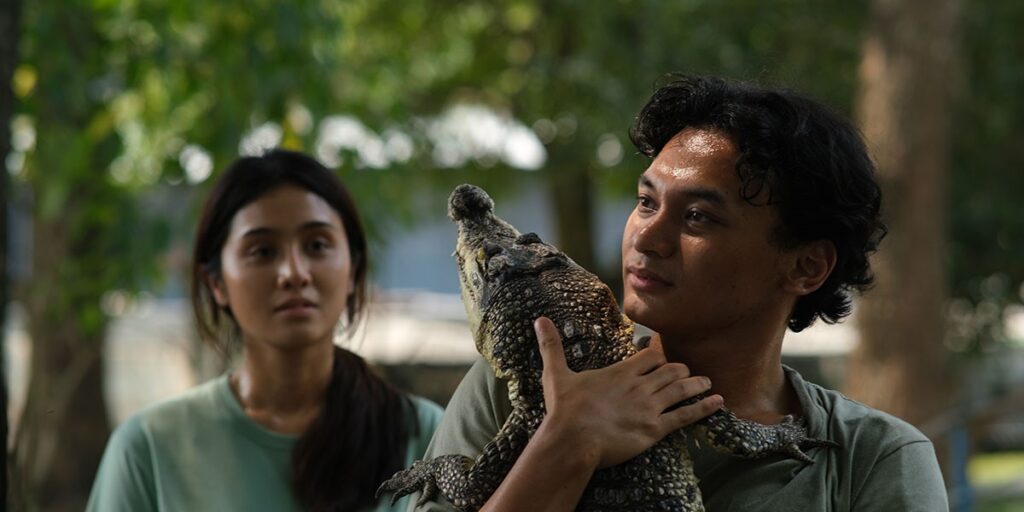
I found a crocodile farm through the internet because of this idea. This idea is very interesting, but if I did not have an actual place where I could shoot this film then I would have had to forget it. So, the first thing I did was google if there was any crocodile farm in Indonesia. Luckily, there was one about 2 hours away from where I lived in Jakarta. So that was a sign I should go there. We were talking about maybe 8 years ago. So, I went there, looked at the place and was mesmerized again— it was very striking just like what you see in the film. It was a strange place. I think it was designed for families but when I was there, I was thinking who in their right mind would bring their children here? (Laughs).
I think there’s something about that place that gave me faith that “Ok, I can do this film”. Because you have the crocodile, you have the park. From there on, I wrote the script based on the real location and my interaction with people who lived and worked there.
So, I had the initial idea of this relationship between mother-son and his future wife, then I incorporated what I found in the actual location, the story, and a lot of interesting stuff. That’s how I finally completed the script, met the producer and we continued the process until the day we were finally able to finish the film.
Marissa, you are a journalist, not just an actress, and rose to prominence through your work at Metro TV- did it help contribute to this movie in any way? If so, how?
Marissa: My difficult childhood, I think, contributed to my understanding of difficult emotions. Right? So, I think it’s almost like a bank. I would like to frame pain in this way- human suffering that we all experience can be transformed into something creative. So, I think my childhood definitely contributes to that. And, I barely had a connection with my parents, just to make it clear. So as a child, I always hungered for connection. That’s why in the end, I took my degree in English teaching because I wanted to connect with children, teach them and make them better. I was not a good performer at school at all— I was always nervous, and my parents were always nervous if I would go to the next grade or not because I always underperformed.
Then, when I became a journalist, it was also a bit about seeking connections. Because I wanted to hear the stories of people, I wanted to understand them, I wanted to connect with them. For some reason, I find human emotions fascinating. Maybe because of my childhood or because of my life story- it’s just fascinating.
I think the role of ‘Mama’ is just an amalgamation of curiosity and understanding. I could understand especially when Tumpal showed me that striking picture. I remember reading his email. And he attached that one picture with the mother crocodile with her jaw open like that. There’s a teeny-tiny crocodile inside her mouth. And immediately I just get it! I got it! The mother being protective and at the same time all humans, including mothers are imperfect— sometimes we snap, and sometimes we feel like “Oh, we are not a good mother”, because there are actions that we do that make us not a good mother. But we actually really love our children. The intention is always there, but the action can come out wrong.
Yeah, it’s basically trying to understand. The message I had to understand the character of ‘Mama’ is that I used my journalistic skills by interviewing Tumpal. It was as simple as, “Tell me who is mama?” And then I came up with all the questions to get into the details of the character until I thought— “I think I get what you mean”.
In the end, my conclusion was that this is a story about love in all the 3 characters. And in my head, the one question was “What is love?” Is love possessive? Or is it letting go? Or is it in between? That’s the question that is being explored in this film from my point of view. My director, Tumpal, may have a different opinion.
So, there you go— interviewing, understanding human emotions by talking to humans and really listening.
Yusuf, you are a soccer player with a background of winning awards in that as well as acting! Which do you like more?
Yusuf: Actually, in soap operas or movies on TV, you had a kid who is playing football. Then this soap opera is going for 6 years and then I became a real ‘cinema’ actor and I am so happy for that because that’s the way I got into the film industry in Indonesia.
According to you, why do you think the movie revolves around crocodiles and humans? It’s also a very strange concept that the movie conveyed.
Tumpal: There are certain qualities in crocodiles— they are lurkers. On the outside, they are very calm, but on one fine day, they can just snap. They are very magnificent creatures. One of the top predators. There is something inherent about them. You cannot guess what they are thinking and I think it is appropriate for the story and characters. Everybody has a secret. Sometimes you don’t know what the other person is thinking about. That’s a very good metaphor for the film.
The other thing is the relationship of Indonesian people with crocodiles. Indonesia is an archipelago. Lots of rivers. So, in our culture, there are a lot of stories about how they are created are related to crocodiles. We have so many rivers and we consider crocodiles sacred. So, there’s another aspect of spirituality in the film. I wanted to use that also in the film. The white crocodiles…and how people talk to the crocodiles. For us, it’s not really that strange. It’s strange for people who live in the city, I guess. But, in some parts of Indonesia they don’t even call them ‘crocodile’, they call them ‘grandmother’, because they are considered as ancestors. I think that was a very interesting idea to explore for the story.
How was it working with crocodiles? There was a scene where a person had to kiss a crocodile. What was risky or was it overall smooth? How many people were involved in taking care of the crocodiles?
Tumpal: All the crocodiles live in a park and are supervised by the government as well. So, it’s not a farm, it’s a park. There is no exploitation activity. The park has been there since the early 90s. What we did there, was we always asked for permission, we had safety people and we had crocodile handlers too.
So, in my script, of course, we spoke about crazy things. Like the attraction with the crocodiles, maybe not the kissing part, but like swimming with crocodiles etc. My producer highlighted this and she was like, “Interesting, but do you know how to do it?” Actually, I didn’t know how to do it. But it was nice in my head (laughs).
Then we asked questions, we really started thinking about the safety measures. I had to adjust the scene where one of the guys kissed the crocodile because I originally wrote that ‘Johan’ (Yusuf’s character) was supposed to kiss the crocodile. But then I learnt that it was impossible and risky, so I changed that. The person who actually kissed the crocodile is an employee himself. He did it so many times; when we watched it, we were like “Ooooh”!
What we did was cheat through camera angles and super-imposing pictures. It’s regular stuff but other than that, there’s no time that I think that was too risky. We had a certain regulation on how many people could enter the crocodile park. But, when I shot that scene, I was very concerned about the other crew members like the camera person and everything. But we had a mitigation plan, if something happened, we would just lift the camera and get up. Luckily, no one got harmed, including the crocodiles. Maybe not the chicken though, because they eat chicken. But finally, everything was smooth and everybody was safe.
Marissa: By the way, the crocodiles have perfect timing. There were a lot of serendipity moments where the crocodile, as if on cue, did what they needed to do. You remember, there is this scene where ‘Mama’ is angry with ‘Johan’ and ‘Mama’ was cleaning ‘Johan’. When I left after being super angry? The white crocodile just gave its back and left ‘Johan’, as if we reject them, as parents— that’s serendipity.
Tumpal: Yeah, that’s true. When we were capturing that moment, the camera actually panned. I was like why is the guy panning now? And then we saw the crocodile and he was capturing that terrific moment.
But Yusuf has another story.
Yusuf: There’s a scene with the baby crocodile. I was ready to shoot it for 2 days because I didn’t know how we were going to do it. But I think by the third take, the baby crocodile pulled it off, and I was like, ok guys, we can go home now (laughs). Yeah, I don’t know why the baby crocodile suddenly turned around and that’s what we wanted! We were just like “Yaay! The baby crocodile turned around!!”
Marissa: Yeah, it was amazing! The baby crocodile started moving back and moving back and I was like “Go there, go there”. They are just amazing actors! It’s not CGI, nor is there any training!
Tumpal: I don’t think we can train them for that scene as they are baby crocodiles. We were very, very lucky (laughs).
To Yusuf and Marissa, how hard was it for you to get into character on set? Marissa, you played a strong woman who in a way lives in the past and is a bit dependant on her son. Yusuf, you played the innocent dutiful son who is not the kind to send his mom to a mental asylum despite the circumstances. Simultaneously, you had to balance your relationship. How difficult was it for you to navigate into this role on set?
Marissa: You remember, our producer, Mandy, asked all of us actors to spend 3 months intensively together, along with Tumpal. We basically had a 4-way discussion where we not only discussed the script and we blocked the scene. By the end, Yusuf really understood ‘Johan’, I really understood ‘Mama’ and Zulfa really understood ‘Arumi’. So, when there were lines that didn’t quite make sense like “I don’t think ‘Mama’ would actually say that; maybe she would just say this instead of this word”.
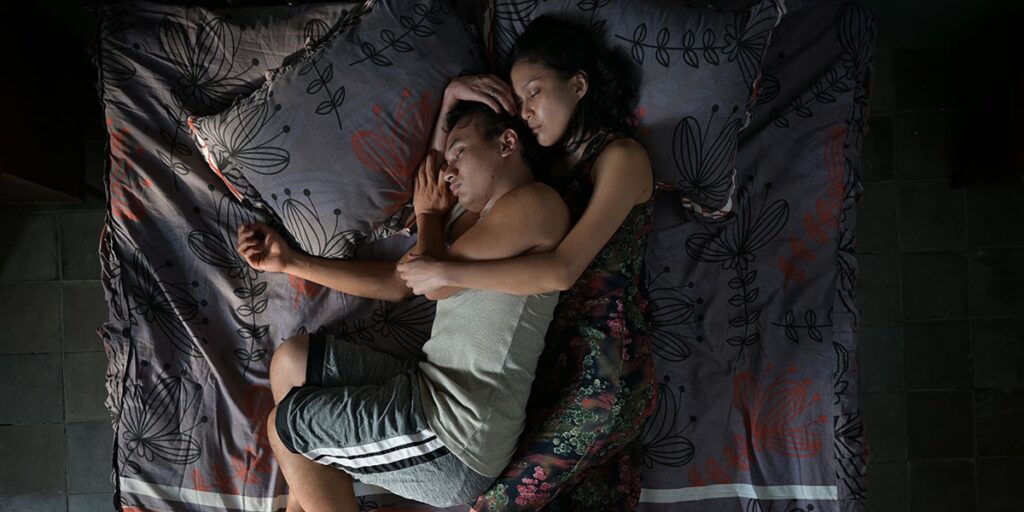
It was a very intensive collaborative process which I personally just really loved. Because, we became a family, you know. And we became a family, there’s this trust between the 4 or 5 of us, including Mandy as the producer, because she is taking care of all of us as well, right? So, I guess because of that process, it made us really open to everything and that’s the key. When we are really open to discussing, it’s just much easier for us to understand the characters and the story. We all have one vision. We all have the same understanding and the same goal. That probably helped create the bond between all the characters and also with the director. Because, Tumpal is the one who had the vision from Day 1.
Yusuf: We did a lot of reading with Tumpal, and the other characters— ‘Mama’ and ‘Arumi’. That helped me to understand what Tumpal wanted for ‘Johan’ and the family dynamics. It really helped me during the 3 months of workshop, to understand every layer in this film.
The animal movement thing with Muhammad Khan, also an actor in this film— a couple of times we had trained with the crocodile movements and it was really hard.
Marissa: Yeah, it was sore because we had to do the crocodile movements (laughs).
Tumpal: I think it’s a good idea for them to move like a crocodile (laughs). They had a session where they had to do the crocodile movement with a coach. He was an animal coach. I think it was a layer for incorporating the crocodile in them. I wanted them to become like a crocodile (laughs).
Marissa: But it’s true! Joking aside, it’s true! I think it was brilliant, Tumpal. The decision that you made that we had to learn the movement. Because that’s why I learnt ‘Mama’s character actually.
Other than practising how to walk like a crocodile, we were also given a day at the time where we were taken to the crocodile park, probably 2-3 weeks before the shoot, just to really get into the idea that we had been living there for 20 years. It was basically to build a backstory. And you could also smell it, because it was fishy in a way, being in the crocodile park. So that would be the smell we had gotten used to for 20 years. You remember when there was that scene where Yusuf’s character was smelling his body while eating the meatball soup? Also, at the time, I remember sitting next to the crocodile pond, literally just watching them and taking notes. “This is the way they sleep; this is the way they sound; this is the way they behave”. Sometimes they would snap their jaws for no reason and it would shock all of us, you know?
‘Mama’ is like that, the way I observe her. She is very observant and watching her baby all the time. She is just watching ‘Johan’ all the time. Because he is the love of her life. Of course. But sometime when ‘Johan’ grows up and no longer says yes to ‘Mama’, he would sometimes rebel a little bit and that would become like “What are you doing, child?!!” (Laughs). That’s when she snaps.
What was your favourite scene in the film and why does it hold special meaning to you? Perhaps one scene that all of you can agree on?
Tumpal: That’s hard.
Marissa: What about ‘Johan’ crawling to the baby crocodile? What do you think of that? That’s striking to me!
Yusuf: It’s my favourite scene actually!
Tumpal: For me, since I am the director, I am really biased. I really like it. I don’t think even in my wildest imagination, a scene will be portrayed like that again. It captured the essence of ‘Johan’s’ character in a very beautiful way because he is longing for his own family. Remember the scene when ‘Arumi’ asks him why he kept the baby crocodile eggs? He answered because he believed that one of them would hatch. He believed in it. He had hopes about life. Life is precious for him. He has seen death surrounding him too, because every time they kill the chicken and feed it to the crocodiles. He has seen so much violence and, with his mother and everything; so, when he sees the baby crocodile, it kind of encapsulates ‘Johan’s’ character.
We don’t know if it’s real or not, because he was drugged, so maybe it’s a hallucination (laughs)…
But they had an interaction.
Also, if you notice there is a scene where ‘Arumi’ asks him, if this crocodile hatches, what would he name it? ‘Johan’ answers that he would name it ‘Jepit’. The short form is ‘Nip’. That was a tribute to my dog who passed away 2 weeks before we shot the film. So, I kind of imagine that the dog was reincarnated again as a baby crocodile. So, in my mind when I see that scene, I think. “She is alive again”.
Thus, for me, that scene was very personal.
Marissa: I agree! I remember that! When ‘Johan’ said ‘Jepit’, immediately I was like “It’s Tumpal’s love”, you know? Unfortunately, she passed away.
Why she was called ‘Nip’?
Tumpal: The translation for this one is very difficult. ‘Jepit’ means ‘Nip’, but it also means ‘stuck’. ‘Jepit’ was a stray dog that my wife and I had found stuck in a fence. I think she had run away and she looked very miserable. We saved her. She needed a name. We tried many names but when we called her ‘Jepit’, she responded. So that’s how she got her name! So, that’s the backstory of ‘Jepit’.
This story is also about life and love. Your faith in life— trying to find a place in life in this world. Which is amazing, but often very confusing.
Who is the funniest person in the cast and crew in real life?
Yusuf: I’ll go with Tumpal (laughs)! Tumpal is a really funny guy. He is always making jokes out of everything.
Marissa: I think I would agree! Mostly, because of his body language. Because Yusuf and Zulfa (who play ‘Johan’ and ‘Arumi’), they love film cameras. The one where you would have just 36 shots. They would be taking pictures all over the set and Tumpal would just voluntarily do funny poses. He would almost make fun of himself as a director going like “This shot is good…what about this?” And he would just make a serious face for the camera. I think he was the only one who made me laugh at the time! (Laughs)
Tumpal: Yeah. I mean I just think the idea of becoming a director is ridiculous. I mean who in their right mind will listen to me?
So, I just tried to make them relax. Because the story was intense. I didn’t think we needed more intensity. Every time I was on the set, I tried to keep everyone cheerful. It’s serious, but not that serious.
For me, the funniest guy was our animal handler, Rio. He is a character. He’d been handling animals for other films also. He is very professional. He has worked with cobras and every dangerous animal you can think of. But he is only afraid of one animal— geckos. Which is very funny to me. They are everywhere. He’s one of the funniest and hardworking guys I know with a mentality of “I can do anything”.
Basically, the set sounds like real fun despite the serious topic addressed.
Marissa: Yeah! It was fun! It was like a breathing set. Everybody was like a family. I don’t think there were many people involved in the film shoot. It was a medium-size, maybe around 90 people. So, we became like family in the end. It felt very warm and very safe.
Tumpal: Thanks to Mandy (Producer, Crocodile Tears)— she is like a mother taking care of us. The set was very quiet, with nobody yelling. We tried to make it on time, but there was no rush.
Marissa: Yeah, the set was very respectful.
Tumpal: It helped that there were a lot of crocodiles there, so maybe people were like “We should be quiet!”
It was a kind of set that I always dreamed of and I am very lucky to have that kind of working environment.
Are you guys going to work together again soon?
Tumpal: Of course, I want to work with all of them again soon! Yet the ‘soon’, we never know. Because this film took 7 years. Hopefully, I won’t need to spend that kind of time again.
Of course, it’s been a privilege and honor to work with all of them. Marissa, Yusuf, Zulfa and every one of them. I am very, very blessed for my first feature to have this kind of experience. They have been very helpful to me. They also have a lot of faith in me, even though I have no background in filmography as evidence. Because this is my debut, they put their trust and faith in me. Luckily, their faith was answered. I am very proud of what we do and how everyone works diligently and gives everything they have. Hopefully, the audience can feel it too…all the hard work we put into this labour of love.
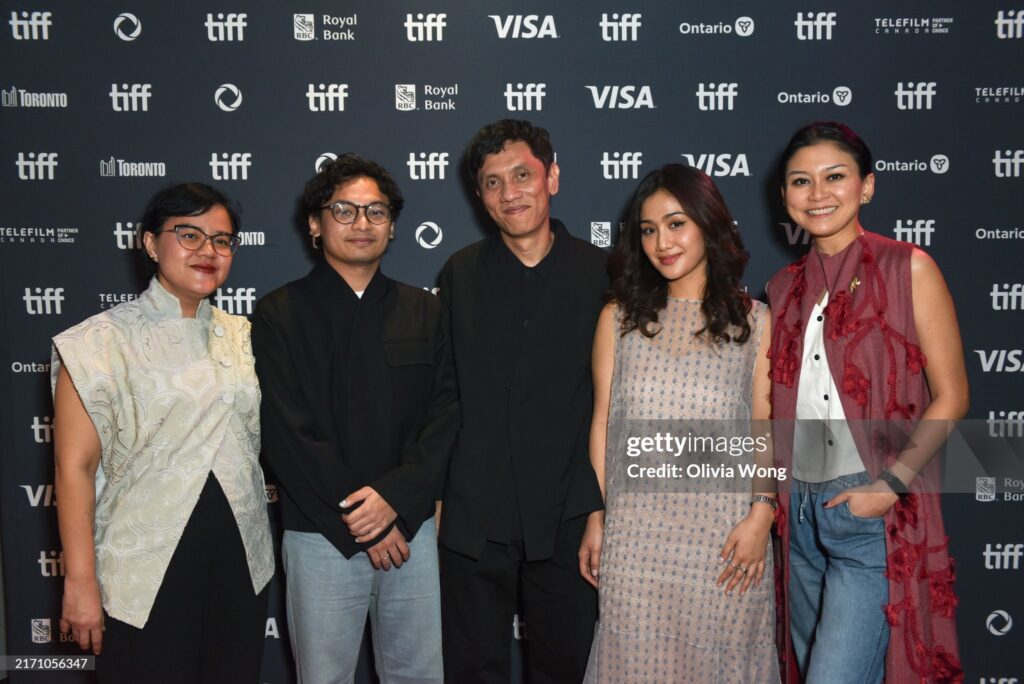
Marissa: That was a perfect summing up by the director. I cannot say anything better…(laughs)
I hope that people will enjoy this film. This film will go to other festivals as well. We were in Toronto and we had so much fun! So many great responses from the audiences! It was just a fantastic energy for us!
After this we are going to Busan, then BFI London.
Tumpal: We are going to compete in the ‘First Feature’ competition at BFI London. So, very happy about that! The festival hasn’t officially announced yet, but we’ll be travelling for it. We are very lucky!
[Author’s Note: Thank you to Tumpal for bringing this spectacular movie to life. Marissa, Yusuf and Zulfa, thank you for embodying the characters so convincingly. Special thanks to Producer Mandy for providing the best care possible for the cast and crew!]
